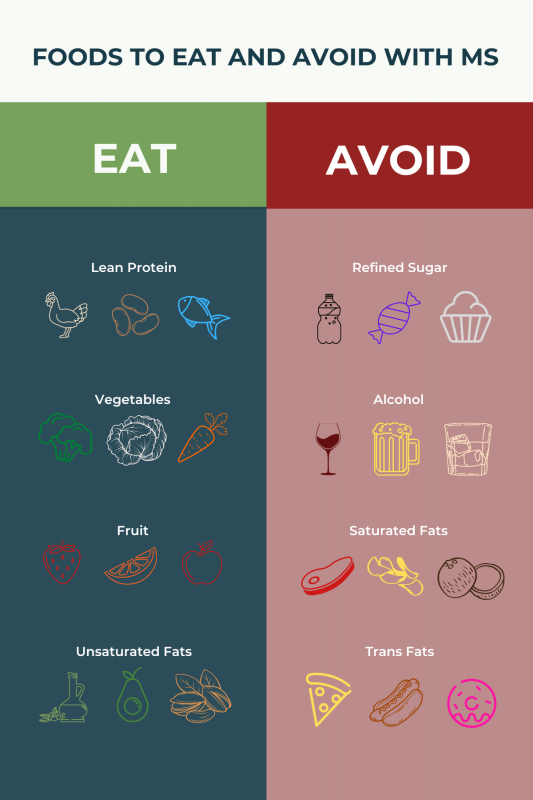Multiple sclerosis diet: Foods to eat and avoid
Multiple sclerosis (MS) is a disorder in which inflammation causes damage to nerve cells in the brain and spinal cord, leading to symptoms such as fatigue, depression, muscle spasms, and difficulty regulating the bladder and bowels.
Lifestyle habits, including diet and exercise, are known to affect the chances of developing MS, and also to influence how the disease progresses over time. But these risk factors are modifiable — unlike genetic or some demographic factors — and adopting a healthier lifestyle can improve the outcomes of MS patients.
Does diet affect MS?
Diet has a wide range of effects on an individual’s health — it impacts a person’s weight, and can alter the risk of heart disease, bone problems, and other health issues. Diet also can change the activity of the microbes that live in the digestive tract, and some substances consumed in the diet and/or made by these microbes can alter inflammation and brain activity.
There is no evidence that any one dietary strategy is best for people with MS. Generally, it’s recommended patients eat a varied and well-balanced diet along the lines of what is typically recommended in the general population — lots of plant-derived foods like fruits, vegetables, and whole grains, and fewer foods that are processed or high in refined sugars and fats.
People with MS are advised to work with their healthcare team to come up with a dietary plan that makes sense for them, and that’s realistic given factors including personal preferences, accessibility, affordability, and cultural traditions.
While diet cannot replace treatment with MS disease-modifying therapies, studies suggest eating a balanced diet that provides for all nutritional needs may help patients better manage and control MS. Specifically, a good diet can help in:
- reducing the likelihood of flare-ups;
- lessening the chances of disability progression; and
- improving both physical and mental health-related quality of life.
Diet also can help to ease some symptoms of the disease. For example, being obese or overweight is linked with worse severity of some MS symptoms, such as fatigue and pain. Changes to diet that help patients lose weight may ease these types of symptoms.
Dietary modifications also may be helpful for managing other specific symptoms of MS.
- Bladder problems: Drinking enough fluids to stay hydrated and avoiding spicy foods, alcohol, caffeine, and fruit juices can help with issues like frequent urination and urinary tract infections.
- Bowel problems: Eating enough fiber and drinking enough fluids can help ease constipation.
- MS fatigue: Problems related to fatigue may be worse if a person’s diet isn’t providing enough energy for the body to function effectively; changes in eating habits may increase vitality.
- Emotional challenges: a varied and balanced diet that avoids alcohol and caffeine may help to ease depression.
What nutrients should an MS-friendly diet include?
Broadly speaking, it’s recommended the diet for individuals with MS should be varied and well-balanced to provide all the nutrients the body needs to function. Components of a healthy diet generally include:
- carbohydrates (sugars and starches), which are used for energy in the body;
- proteins, used for growth and to repair damaged tissue;
- fats, which serve as an energy source and are important for absorbing other nutrients;
- vitamins and minerals, a broad group of essential nutrients needed for a range of bodily functions; and
- fiber, an undigestible plant matter that helps food pass through the intestines.
Some specific nutrients of particular relevance to MS include:
- Vitamin B12: This vitamin is used to make myelin, the fatty wrapping around nerve fibers that becomes damaged in MS. While a deficiency in this vitamin may result in MS-like symptoms, there is no evidence that B12 supplements benefit MS patients with normal levels of the vitamin.
- Vitamin D: Affecting a number of biological functions, this vitamin is known to impact immune activity. Low vitamin D levels have been linked with an increased risk of MS and more severe disease activity.
- Calcium: This mineral is needed to maintain healthy bones. Calcium supplements may be given to MS patients at risk of bone problems — for example, individuals who have limited mobility or are taking steroid medications.
- Essential fatty acids (EFAs): EFAs are a class of polyunsaturated fats that cannot be synthesized in the body and must be acquired through diet. They are needed to repair damaged nerve cells and to produce certain signaling molecules that control inflammation. There are two main types of EFAs — omega 3 and omega 6 fatty acids.
- Antioxidants: Oxidative stress is a type of cell damage that contributes to inflammation in MS. Antioxidants, as their name suggests, are molecules that can lessen oxidative stress, thereby helping to reduce inflammation and neuronal damage. Common antioxidants include vitamins A, C, and E, as well as compounds such as flavonoids and beta-carotenes.
Foods to eat
Fruits and vegetables
Most fruits and vegetables are a good source of carbohydrates, vitamins, minerals, antioxidants, and fiber. A higher intake of fruits and veggies has been linked with less disease activity and disability among MS patients.
Whole grains
Whole grains are a good source of complex carbohydrates and fiber. Research has linked more whole grain intake with less severe MS-related disability.
Lean protein
Skinless chicken, fish, and plant-based proteins such as beans, peas, lentils, and soy products, are different kinds of lean proteins. All are considered good foods to eat to get protein without consuming a lot of saturated fats, which have been linked to more severe disease among MS patients.
Unsaturated fats
Unsaturated fats, particularly polyunsaturated fatty acids or PUFAs — which include EFAs — have been shown to have anti-inflammatory and nerve-protecting properties in animal studies. Of note, studies of PUFA intake in MS patients have shown inconsistent results. Foods rich in PUFAs and EFAs include oily fish like salmon and mackerel, and some nuts and seeds like walnuts, soybeans, and flax seed.
Another kind of unsaturated fat, monounsaturated fatty acids or MUFAs, are found in food like avocados, peanut butter, and vegetable oils. These are less well-studied in MS but have been tied to a reduced risk of heart disease in the general population.
Water
Staying hydrated is critical for maintaining health, and regularly drinking enough water can help to ease constipation and avoid bladder infections.
Foods to avoid
Saturated fats
Considered unhealthy fats, saturated fats have been linked to an increased risk of heart disease; they also have pro-inflammatory effects. In animal models of MS, eating a diet high in saturated fat leads to more inflammation, and higher saturated fat intake has been linked with increased relapse risk and more disability among MS patients. Saturated fats are mainly found in animal-based foods such as whole milk, high-fat cheese, pastries, cured meats, and fatty cuts of meat. Some plant-based foods such as coconut oil, palm oils, and cocoa butter also are high in saturated fat.
Trans fats
Trans fats are strongly associated with an increased risk of heart disease, so most experts recommend limiting the amount included in the diet. Fried foods, commercial baked goods, frozen pizza, margarine and other shortening foods, and processed foods commonly have a high trans fat content.
Refined sugar
The effects of a high-sugar diet — containing a lot of sweetened beverages and cereals, cookies, and cakes — have not been confirmed in studies of people with MS. But a high sugar intake can promote inflammation and lead to more aggressive disease in MS mouse models. A small study found that MS patients who drink more sugar-sweetened beverages like soda tend to have more severe disease. High sugar intake also is linked with a higher risk of other conditions, like diabetes and heart disease, that may exacerbate the symptoms of MS.
Alcohol
Evidence suggests the overall severity of MS is not affected by alcohol intake. However, especially in large quantities, alcohol’s effects on the body can cause worsening of numerous MS symptoms, including coordination difficulties, bladder problems, and depression. Alcohol also may interact with medications. Consequently, it’s generally recommended that people with MS should practice moderation in their alcohol intake, and should discuss how much alcohol it is safe to consume with their healthcare teams.

More research needed
Dairy
It remains unclear whether consuming dairy products affects the course of MS. Some studies have found MS patients who consume more dairy tend to have more severe disease, but other studies have reported the exact opposite trend, with more dairy consumption linked to less severe MS. Full-fat dairy products are often high in saturated fats, but dairy also can be a good source of protein, calcium, and vitamin D. Some experts recommend MS patients stick with low-fat dairy options or dairy alternatives, which include products made from nuts, soy, and oats.
There is experimental evidence that an immune system attack against a protein found in cow’s milk can lead to MS-like autoimmunity in the nervous system, but the clinical relevance of these findings for people with MS is unclear.
Salt
Some research has suggested a link between higher salt (sodium) intake and more severe MS, but other studies have shown no connection between salt consumption and MS severity. A high-salt diet can increase the risk of other health problems like high blood pressure, so it’s generally recommended that salt in the diet be moderated.
Gluten
A few studies have explored whether gluten intake may influence MS, but there is not enough evidence to make any conclusions one way or another. Available evidence suggests the rate of gluten intolerance, known as celiac disease, is no higher among MS patients than in the general population.
Vitamin D
Vitamin D is mostly produced in the skin upon sun exposure but also can be obtained in the diet through food or supplements. This vitamin is important for maintaining bone health, and also can modulate the activity of the immune and nervous systems.
A deficiency in vitamin D has been linked with an increased risk of MS, and patients commonly have lower-than-normal levels of this vitamin. In MS patients with low vitamin D levels, supplements or other interventions that aim to normalize vitamin D levels are generally recommended.
Some studies have tested whether additional vitamin D supplementation may provide benefits to MS patients. So far, however, the data have not shown any clear benefit of vitamin D supplements beyond maintaining normal levels. Clinical trials in MS patients also suggest that high doses of vitamin D supplementation bring no added benefit over lower doses.
Special diets for MS
There is no single diet universally recommended for people with MS. Still, several dietary strategies have been developed for multiple sclerosis, which generally aim to provide for the body’s nutritional needs while avoiding foods that could worsen inflammation.
Some of these diets have been explored in clinical trials, but studies are generally small, lack comparison groups, and often have high dropout rates. These factors can make it hard to determine how meaningful the results are.
It’s also important to keep in mind that researching the impacts of diet among people is necessarily complicated, given the other factors at play — from genetics to lifestyle, and even whether or not someone chooses to participate in clinical research — that may affect the results.
Best Bet diet
The Best Bet diet is based on the idea that molecules in certain foods may leak out of the intestines and worsen the inflammatory attack that drives MS. It is a strict exclusion diet that recommends cutting out all dairy, grains, legumes, sugar-rich foods, and any foods that may cause an allergic reaction, such as eggs and yeast. It also recommends reducing the intake of saturated and polyunsaturated fats, salt, and alcohol.
Developed by Ashton Embry, a geologist whose son has MS, the diet consists mainly of fish and lean meats, lots of fruits and vegetables, and olive oil. It also recommends a number of nutritional supplements, such as vitamin D, calcium, magnesium, and omega 3 fatty acids.
While some people with MS report feeling better on this diet, there is no research showing benefit for MS patients. Because the diet cuts out many food groups, it’s important that any MS patients following it should take precautions to ensure they get all needed nutrients.
Ketogenic diet
A ketogenic or “keto” diet is one that is low in carbohydrates and high in fats, leading the body to use fats as its main energy source — a process called ketosis. The diet was originally developed to help manage certain seizure-causing disorders.
A few small studies have indicated that following a keto diet may help to ease fatigue and depression, and improve quality of life in people with MS. However, the diet also may have negative effects, like vitamin deficiencies or digestive upset. In rare cases, it can cause serious problems with the pancreas and liver.
McDougall diet
The McDougall diet is a low-fat, plant-based diet rich in complex carbohydrates, whole grains, fruits, and vegetables. It completely cuts out meat, dairy, oils, and all other foods that come from animals, and only allows small amounts of sugar and salt.
In studies, the McDougall diet has not shown any effect on measures of MS progression, such as relapse rates or inflammatory activity on MRI scans. But some research suggests the diet may help ease fatigue in MS patients.
Mediterranean diet
As its name suggests, the Mediterranean diet is based on the foods that are commonly eaten in cultures surrounding the Mediterranean Sea. The diet includes plenty of fruits and veggies, whole grains, and olive oil, and recommends a moderate amount of low-fat dairy products, fish, poultry, and red wine. Only limited amounts of red meat, sweets, and animal fats are included in this diet.
There is not much research specifically evaluating the Mediterranean diet in MS, though the plan is generally considered well-balanced and nutritionally complete. Some small studies suggest it could help ease fatigue, as well as reduce the impact of MS symptoms and delay disability progression.
Overcoming MS diet
The overcoming MS (OMS) diet is a plant-based diet that also includes fish and seafood, but cuts out all processed foods, eggs, meat, dairy, and saturated fats. The diet usually includes daily supplements of flaxseed oil or fish oil. Additional supplements or dietary modifications may be needed to ensure patients get enough nutrients, like protein, iron, and calcium.
The diet was developed by George Jelinek, MD, an Australian doctor who was diagnosed with MS in the late 1990s, as part of a lifestyle program that includes diet, exercise, and meditation, alongside medical treatment.
A few small studies have reported that this diet or lifestyle intervention is associated with increased mental and physical quality of life, and a columnist with Multiple Sclerosis News Today also reported feeling better just a few weeks into the diet. But the studies usually lack a comparison group so it’s difficult to draw firm conclusions.
Paleo diet and the Wahls protocol
The paleolithic or Paleo diet involves eating foods that are thought to be similar to what ancient humans ate before the advent of farming and agriculture. The diet mainly includes meats, fish, nuts, vegetables, and fruits, while it excludes processed foods, grains and beans, potatoes, cereals, dairy, and eggs.
The Wahls protocol is a lifestyle intervention that combines a Paleo-inspired diet with vitamins, meditation, and exercise. The protocol is named for Terry Wahls, MD, an American doctor with MS who promoted it.
There is some evidence that a Paleo or Wahls diet can help to ease fatigue and improve quality of life in people with MS. However, because the diet cuts out many large groups of food, it may increase the risk of nutritional insufficiencies, so it’s important that patients work with their care team to ensure that their nutritional needs are being adequately met.
Swank diet
The Swank diet mainly advocates strictly limiting fat intake, emphasizing low-fat dairy products, whole-grain starches, fruits, and veggies, and cutting out red meats and oily fish. Proposed in 1948 by neurologist Roy Swank, MD, PhD, the diet also recommends cod liver oil and vitamin supplements to ensure patients meet all their nutritional requirements.
A study conducted by Swank more than 30 years ago suggested that people who followed the diet had lower risk of relapse, disability, and mortality than those who didn’t. But the study did not include a control group or a scoring system for MS disability, so the meaningfulness of these results is debatable. More recently, a small 2021 clinical trial suggested the Swank diet may ease fatigue and improve physical quality of life in MS patients.
Intermittent fasting and calorie-restricted diets
Calorie restriction, as the term suggests, is a dietary strategy that involves limiting the amount of calories (units of energy derived from food) one consumes. It commonly involves cutting out high-calorie foods that contain a lot of fats and sugars.
Intermittent fasting is a form of calorie restriction in which the amount a person eats is strictly limited or prohibited at certain times, while the rest of the time the person eats according to their normal habits, without cutting out any specific food type.
Research has indicated that a low-calorie diet can help to reduce markers of inflammation, and some small studies reported MS patients have better emotional health (e.g., better well-being and less severe depression) after following these diets. However, this type of diet may not meet all of a person’s nutritional needs so it can lead to substantial weight loss. Other negative effects may include poorer bone health, reduced sex drive, and irregular menstrual periods.
Multiple Sclerosis News Today is strictly a news and information website about the disease. It does not provide medical advice, diagnosis, or treatment. This content is not intended to be a substitute for professional medical advice, diagnosis, or treatment. Always seek the advice of your physician or other qualified health provider with any questions you may have regarding a medical condition. Never disregard professional medical advice or delay in seeking it because of something you have read on this website.
FAQs about MS and diet
While a number of diets have been developed for people with multiple sclerosis, there is no one diet that is considered best for the neurodegenerative condition. It’s recommended that patients work with their healthcare team to figure out a healthy diet plan that works for them.
Some dietary changes may be useful for managing specific symptoms of multiple sclerosis (MS) — for example, getting enough fiber and fluids can help ease constipation, and staying hydrated while avoiding caffeine, alcohol, and fruit juices may help manage bladder problems. More generally, there is some evidence that symptoms of MS are generally less bothersome in people who eat a healthy and balanced diet, but there is no diet that is proven to reduce the severity of MS.
Multiple sclerosis (MS) is caused by inflammation in the body that damages nerves in the brain and spinal cord. There is no cure for MS, and the disease cannot be reversed with any diet or lifestyle change, nor any available medication.
A few studies have indicated that intermittent fasting and other calorie-restricted diets may reduce markers of inflammation and reduce the severity of depression in people with multiple sclerosis (MS). But these diets may increase the risk of weight loss, poor bone health, and irregular menstrual periods. MS patients are advised to talk with their healthcare team before trying any new dietary plan.
Related Articles
-
October 8, 2021 by Bionews Staff
Newly Diagnosed With Multiple Sclerosis
-
September 27, 2021 by Bionews Staff
Pain and Multiple Sclerosis
-
September 29, 2021 by Bionews Staff
Sex, Intimacy, and Multiple Sclerosis
-
September 22, 2021 by Bionews Staff
Living Well With Multiple Sclerosis

 Fact-checked by
Fact-checked by 






